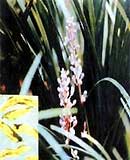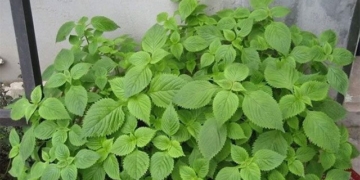Many young girls may experience underdeveloped breasts during puberty due to factors such as zinc deficiency or general health issues. Some traditional Chinese medicine remedies may help improve this condition.
Recipe 1:
 |
Ophiopogon |
9 g of Rehmannia, 15 g of dried ginger, 6 g of Codonopsis, and 60 g of malt candy. Boil the first three herbs in water to extract the essence, then discard the residue. Melt the malt candy and mix it with the herbal infusion. Consume this mixture three times daily. This remedy is suitable for those who are weak, extremely fatigued, have poor appetite, frequently feel cold, or experience cold pain in the abdomen, with symptoms like cold hands and feet, pale complexion, and a white-coated tongue.
Traditional Chinese medicine suggests that a deficiency in the spleen and stomach can lead to poor nutrient absorption, resulting in insufficient qi and blood, which fails to nourish the body effectively, often leading to a weak appearance and a pale or sallow complexion. This remedy warms the center, disperses cold, alleviates pain, tonifies the spleen and stomach, and has antibacterial properties. This formula promotes the generation of qi and blood, leading to a fuller physique and enhanced breast development.
Recipe 2: 24 g each of wolfberry fruit, Poria, astragalus, and ginseng; 30 g each of scutellaria, ophiopogon, and cassia seed; and 3 g of licorice. First, roast the astragalus with honey and lightly roast the cassia seeds. Then grind all ingredients into a fine powder. Take 6-15 g of this powder on an empty stomach before meals, three times a day.
Adding 15 g of bupleurum to this formula can enhance breast fullness. This remedy is suitable for those who are often mentally fatigued, have chest congestion, feelings of heat, fatigue, frequent insomnia, and symptoms like a red tongue with a yellow and sticky coating.
Traditional Chinese medicine considers the breasts as a pathway for the liver meridian, which regulates the spirit and physical condition. Conversely, emotional changes can significantly impact the liver, indirectly affecting breast health. This remedy is effective in calming the mind, tonifying qi, nourishing yin, dispelling dampness, and alleviating mental stress, which can contribute to breast fullness. Additionally, this remedy may help reduce excessive leucorrhea and has cooling properties that can address issues like body odor and halitosis.
Recipe 3: 10 g each of ginseng, white atractylodes, astragalus, dried tangerine peel, cinnamon, and polygala; 3 g of licorice; 12 g each of Angelica sinensis, Poria, and white peony; 15 g of rehmannia; 6 g of schisandra; 3 slices of fresh ginger; and 2 red dates. Combine all ingredients in a pot, boil to extract the essence, and discard the residue. Drink the herbal infusion before meals, three times a day.
This remedy is intended for individuals with both qi and blood deficiencies, who experience restlessness, insomnia, forgetfulness, vivid dreams, poor appetite, pale complexion, dry skin, brittle nails, weak muscles, and hair loss, along with a light-colored tongue and weak pulse.
Traditional Chinese medicine asserts that abundant and flowing qi and blood are crucial for maintaining beautiful breasts. Therefore, the purpose of this remedy is to nourish qi and blood, leading to healthier and more beautiful breasts, toned muscles, a fuller figure, and a vibrant complexion.
Recipe 4: 10 g each of Angelica sinensis and white peony; 6 g of ligusticum; and 15 g of rehmannia. Boil all ingredients and drink the herbal infusion before meals, three times a day. This remedy is suitable for those with blood deficiency, a weak constitution, pale skin, dizziness, a pale tongue, a white-coated tongue, and irregular or scant menstrual flow.
This remedy works to nourish the blood and invigorate circulation, potentially leading to fuller and healthier breasts while improving symptoms of anemia over time.
Recipe 5: 15 g of ginseng; 10 g of white atractylodes; 12 g each of Poria, dried tangerine peel, and pinellia; and 3 g of licorice. Boil all ingredients and drink the herbal infusion before meals, three times a day. This remedy is for those with spleen and stomach deficiency, characterized by a weak constitution, decreased appetite, frequent loose stools, a sallow or pale complexion, feelings of breathlessness, fatigue in limbs, and a pale tongue with a white or sticky coating.
This remedy strengthens the spleen, increases qi, nourishes the stomach, and enhances spleen function, promoting abundant qi and blood, leading to a fuller body, vibrant spirit, and a beautiful complexion.
Dr. Le Thu Huong




















































